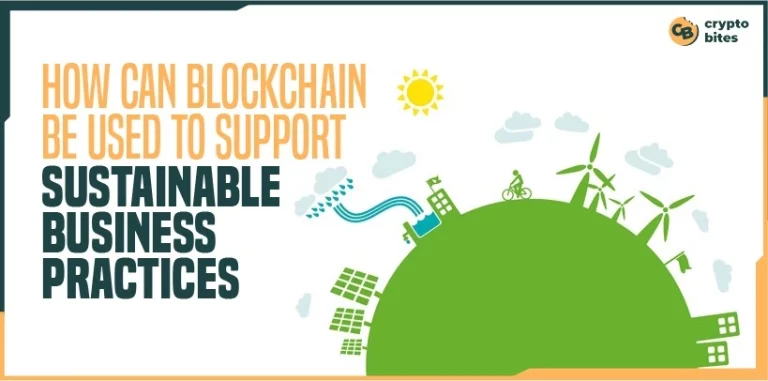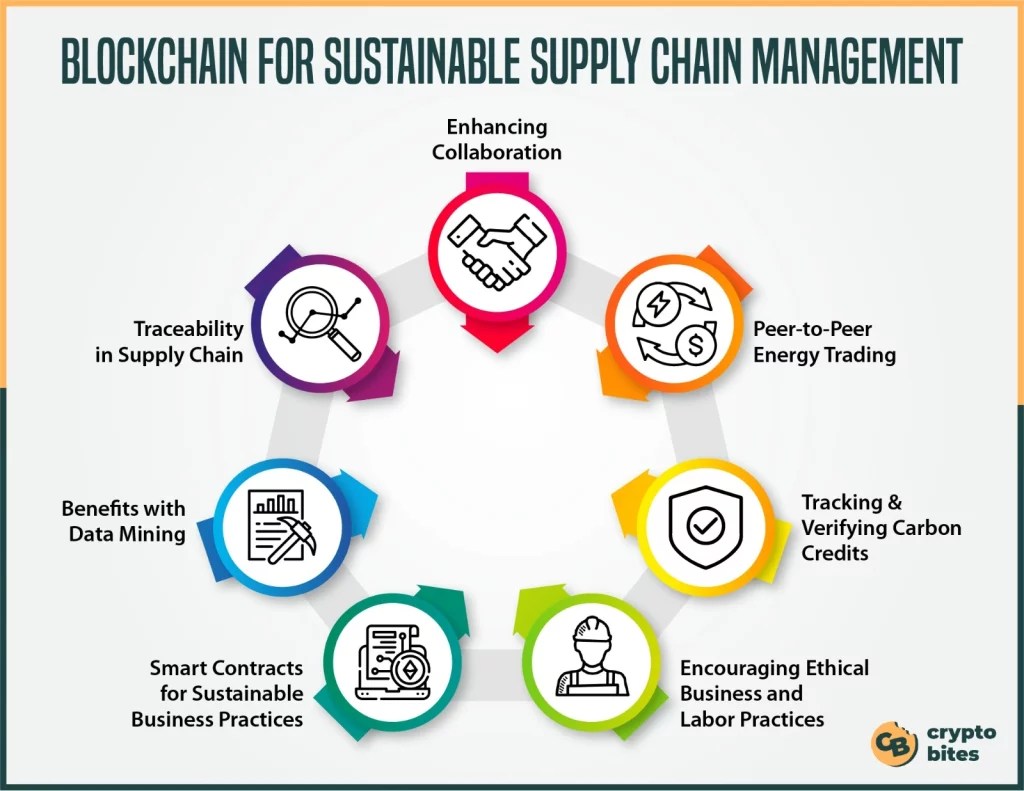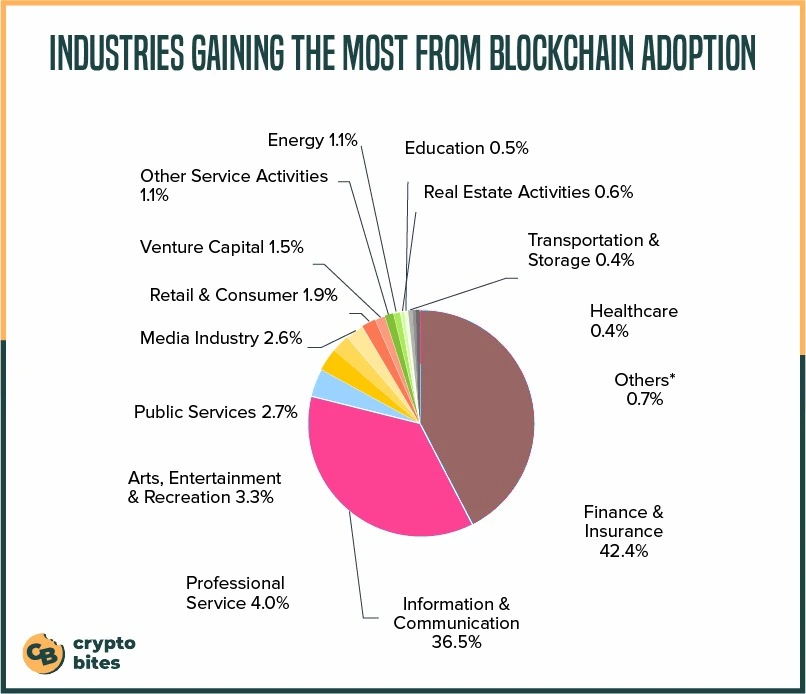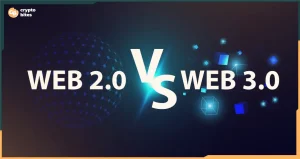
How Can Blockchain Be Used To Support Sustainable Business Practices
Disclaimer: This is not intended as investment advice in any form.
Introduction
Remember when Bitcoin burst onto the scene, it posed limitless possibilities and had the cool factor. Fast forward to 2023, NFTs and cryptocurrencies have had their time in the limelight, but now, old school sustainability is the future, especially for businesses. The ultimate goal of blockchain is also turning towards sustainability. It’s fascinating how tech trends shift over time to address pressing concerns.
Meaning – it’s no longer about digital coins or NFTs; it’s a powerful force behind transparent supply chains, renewable energy trading, fair trade, and more. All the banks and institutions that are following suit are getting into the blockchain and crypto space.
Now that the world is moving towards a sustainable future because they all wanted something with less hassle and more trust; but how did blockchain become such a big part of that? You’re about to find out!
How Does Blockchain Technology Support Sustainable Business Practices?
We design our organizations to be well-oiled machines. But working with other businesses often proves to be a coordination nightmare.
Every company uses different systems and nobody wants to trust their competitors with all of their data. Corporations want to learn how to work efficiently with less trust.
Bitcoin has proven that this kind of collaboration is actually possible. It has become a native currency for the internet and the blockchain is one of the components that makes it possible.
Let’s take a look at how businesses can use this technology.
1. Decentralization
Blockchain is like a digital teamwork tool. It’s where power and responsibility aren’t in one person’s hands but are shared among many.
Just think about it: instead of one boss calling all the shots, everyone collaborates and agrees together, like friends planning a fun adventure.
The benefit? It creates fairness and makes it really hard for anyone to play unfair tricks.
2. Fraud Reduction
Blockchain is a digital truth-teller. It gives each item a unique, unbreakable code, like a badge of authenticity.
Think about buying a luxury handbag or organic food. With blockchain, use your phone to trace its journey from factory to store.
The bonus? It’s like having a personal investigator for everything you buy.
3. Establishing Transparency
Blockchain is similar to a really transparent diary that anyone can see but can’t edit. Picture yourself purchasing a fancy shirt. You can use blockchain to look into a special diary and see every step that the shirt took, from the cotton field to the store shelf.
You can find out where it was made, who made it, and even the specific cotton field it came from. It’s like a secret agent spilling all the details about your shirt.
This fantastic method can be used to check the authenticity of literally everything. From luxury products to food; all in just one click.
4. Reduced Costs
With block chaining, you have a super-efficient free assistant who will keep a record of everything without making any mistakes or misplacing anything.
In the business world, it does the very same thing. Blockchain helps companies keep their records super organized without the need for expensive middlemen or complicated systems.
5. Aids in Monitoring Resource Consumption
Can you imagine getting a text from your water meter if it detects a leak? That’s how blockchain technology can help monitor and conserve resources like water.
Benefits? By spotting waste early, you can save money and also contribute to helping the planet.
6. Faster Transaction
Back in the day, people would wait in a busy store to get their products. Blockchain revolutionized the business world by speeding up transactions.
With blockchain, customers receive their orders instantly and simultaneously. It’s like putting transactions into blocks and checking them together, kind of like an efficient assembly line.
What are the benefits? Yeah, lightning-fast transactions are great! They save time for everyone and make business more efficient.
7. Automated ESG Financing
Automated ESG Financing in blockchain is a system that uses smart contracts to automatically fund projects that promote environmental, social, and governance (ESG) goals.
What if a company wants to use blockchain to support eco-friendly projects? Automated ESG financing uses smart contracts to send money directly to projects, avoiding the need for complicated paperwork.
Benefits are ESG investments faster and more transparent, like a turbocharged engine for sustainable projects.
8. Incentivize Sustainable Business Practices
Incentivizing Sustainable Business Practices in blockchain involves using digital rewards to motivate companies to embrace eco-friendly and ethical methods.
What if a manufacturer could earn tokens by reducing waste and using clean energy? The company can trade or use these tokens as incentives for promoting sustainable practices.
These can be like a medal for the project ”planet green” as well.
9. New Form Of Insurance For Businesses
The new form of insurance for businesses in blockchain is a digital insurance model that uses smart contracts to automate claims and reduce fraud.
This way a business could receive an immediate payment for a delivery that got damaged.
Blockchain for Sustainable Supply Chain Management
Blockchain for Sustainable Supply Chain Management is a technology that uses a digital ledger to keep track of every step in making and delivering products. It helps ensure transparency and security. On the blockchain, each entry represents an event or transaction. It could be about raw materials, manufacturing, transportation, or even labor practices and environmental impact.
Let’s look at how it works:

Traceability in Supply Chain
Traceability in the Supply Chain with Blockchain is the ability to track and verify the journey of products from their origin to the end consumer using a digital ledger.
Think of a company that makes organic coffee beans. They use blockchain traceability to track each bag of coffee from the farm it was grown on to the date it was harvested.
Transparency is great because it helps consumers trust the product more. When they know it’s authentic and high-quality, they’re more likely to buy it. This also helps improve the brand’s reputation.
Enhancing Collaboration
Using blockchain technology in supply chain management can help improve collaboration and information sharing among all participants.
How does it help? When collaboration is improved, everyone in the supply chain can make decisions faster, avoid delays, and meet customer demands more efficiently.
Peer-to-Peer Energy Trading
Peer-to-peer energy trading with blockchain allows people and businesses to easily buy and sell extra energy to each other using a digital ledger.
In this business situation, there is a solar-powered factory that is using blockchain technology to sell its extra electricity to nearby businesses. This means they don’t have to rely on traditional energy suppliers.
This helps businesses save money on energy, be more environmentally friendly, and collaborate with each other.
Tracking and Verifying Carbon Credits
Tracking and Verifying Carbon Credits in the Supply Chain with Blockchain involves using a digital ledger to follow and confirm the environmental impact reduction efforts and carbon credits generated by businesses.
The end result can be a huge contribution towards making our planet green.
Encouraging Ethical Business and Labor Practices
Using blockchain technology in supply chains can help ensure fair treatment of workers and promote responsible business practices. It involves using a digital ledger to track and verify ethical behavior.
In this scenario, there is a clothing brand that is using blockchain technology to make sure that their factories abroad are meeting labor and ethical standards. They want consumers to be able to access the records of these factories.
The benefit of this is that it builds trust, allows consumers to support ethical brands, and encourages businesses to maintain high standards, resulting in improved working conditions and responsible practices globally.
Smart Contracts for Sustainable Business Practices
Smart Contracts for Sustainable Business Practices in the Supply Chain with Blockchain are digital agreements that help enforce and encourage environmentally friendly and ethical actions among supply chain partners.
Using this approach makes business dealings more ethical, reduces paperwork, and promotes sustainable practices. It benefits both producers and consumers by making the supply chain more transparent and responsible.
Benefits with Data Mining
Data mining in supply chain with blockchain helps extract valuable insights and patterns from the data stored on the blockchain.
Imagine a retail company that uses data mining to analyze customer buying behavior from blockchain records. They do this to improve their inventory management and predict future demand.
The benefit is that it helps businesses make smarter decisions, reduce waste, and improve efficiency. This allows them to better respond to customer needs and increase profitability. Travel agencies can receive a lot of benefits from this feature.
Tokenization and Green Finance
Tokenization is basically converting something tangible, like property or a company share, into a digital token on a blockchain. It’s a way to make buying, selling, and trading property or assets online easier.
On the other hand, Green Finance is all about using money to support projects and businesses that are good for the environment. Investing in solar panels or eco-friendly companies can contribute to making the world cleaner and greener. That involves reducing paper-made currencies as well.
Tokenization of Sustainable Assets
Tokenization in blockchain is the process of converting real-world assets or rights into digital tokens that can be traded and managed on a blockchain network.
An organization that uses blockchain to tokenize carbon credits. This allows companies to buy and trade these tokens to offset their carbon emissions.
The benefit of this is that it makes the carbon credit market easier to understand and more open, which motivates businesses to go green and helps reduce carbon emissions.
Crowdfunding for Sustainable Projects
Crowdfunding for Sustainable Projects in Blockchain is using blockchain to raise funds from a large number of people for environmentally friendly initiatives.
The solar energy startup is using blockchain crowdfunding to gather small investments from people all over the world. They want to use the funds to build solar farms.
The benefit is that it allows people from all over the world to get involved in sustainable projects, which helps promote the use of renewable energy and decrease carbon emissions.
Tokenization and Circular Economy
It’s a way to turn physical assets into digital tokens on a blockchain. This helps promote sustainability and recycling.
This process is mainly used in electronic devices. The world is suffering from copper scarcity, and reusing copper from older devices can help us out of the situation.
Green Finance and Sustainable Governance
Using blockchain technology to promote environmentally friendly financial practices and ethical governance in business operations.
The multinational corporation is using blockchain to track its environmental impact. This helps shareholders keep an eye on the company’s sustainability efforts.
This can reduce harm to the environment and promote ethicality.
Challenges in Implementing Blockchain for Sustainability
There are challenges that come up when trying to use blockchain for sustainability. To handle the challenges of scaling blockchain systems, managing energy-intensive operations, and navigating complex global regulations, it’s necessary to come up with innovative solutions.
It’s important to overcome these challenges so that blockchain can reach its full potential. Here are some obstacles which corporations face on a regular basis:
1. Energy Efficiency
Traditional blockchain networks like Bitcoin consume vast amounts of energy, posing environmental concerns.
Transition to energy-efficient consensus mechanisms, such as proof-of-stake or proof-of-authority can be a solution to this problem.
2. Scalability
As blockchain networks grow, they may struggle to handle a high volume of transactions quickly.
Layer-2 scaling solutions like the Lightning Network for Bitcoin or sharding can make the network more scalable.
3. Regulatory Compliance
This is a navigating complex and differing regulations in various regions can hinder blockchain adoption.
The solution to this is to work together with regulators and create industry standards to follow the law and make it easier for everyone to use.
4. Data Security
Securing data on a blockchain is challenging, especially when dealing with private or sensitive information.
Employee robust encryption techniques and improved key management systems can be a solution to this threat.
5. Adoption and Integration with Legacy Systems
Integrating blockchain with existing systems and getting everyone on board can take time and be complicated.
Developing user-friendly interfaces can reduce the problem to a lower scale.
Case Studies of Sustainable Industries That Use Blockchain Technology
There are so many blockchain use cases from other industries around the world. sole of these are –
- Burst IQ uses big data-supported smart contracts that make the transfer of sensitive medical data between patients and doctors possible.
- Propy is a real estate tool that uses blockchain to automate the process, letting titles be issued right away, and it even lets people buy and sell land using cryptocurrency.
- AirCarbon, a Singaporean start-up, made a blockchain website in 2019 for buying and selling carbon credits. With blockchain, they can check the credits and decreases in emissions to make sure they are real.
- Bumble Bee Foods, partnered with blockchain start-up SAP to implement blockchain technology in their seafood supply chain. This technology allows consumers to trace the entire journey of their seafood.
- LO3 Energy, a US-based start-up, utilizes blockchain technology to facilitate peer-to-peer energy trading. Their platform enables consumers to exchange surplus renewable energy from their solar panels and wind turbines.
- RCS Global, a blockchain Indian start-up, employs blockchain technology to enable transparent tracking of cobalt used in electric vehicle batteries.
- Power Ledger, an Australian start-up, utilizes blockchain technology to create a platform for trading renewable energy certificates, guaranteeing their authenticity and accurate verification of renewable energy sources.
- De Beers, the British diamond mining company, collaborates with blockchain start-up Everledger, using blockchain technology to track diamonds’ entire journey, from mining to consumers, effectively reducing the risk of conflict diamonds entering the market.
- TextileGenesis, a Hong-Kong blockchain start-up, employs blockchain technology to create a transparent and traceable supply chain platform for cotton, ensuring complete visibility from farm to finished product.
- EY has partnered with blockchain start-up VeChain to create a system to track down a bottle of wine to the retailer.
- Walmart and Nestle has a block chain system running to assure the authenticity of their products from the farm to the super shop.
- Loomia, A New York platform that started in 2014 has made a way for companies to keep track of clothes from the time it is designed until it is thrown away.
Industries Gaining the Most from Blockchain Adoption
Many sectors can benefit from adopting blockchain technology for sustainable business practices. These sectors include fintech, healthcare, and cybersecurity. How?

By using blockchain’s capabilities, they can improve transparency, efficiency, and traceability in their operations. This, in turn, helps them advance their sustainability goals.
1. Blockchain in Cybersecurity
Bitcoin and other digital currencies can now be used safely and securely, thanks to blockchain technology. How?
To do this, it provides safe and unchangeable data storage and transmission. Blockchain basically makes it possible for more trust and openness in the cybersecurity area.
2. Blockchain in Fintech
Blockchain is becoming a dependable database for financial services. It achieves this through several key methods.
For one, Blockchain establishes shared operating models to streamline operations. It helps in reducing expenses.
Additionally, blockchain allows for the creation of more comprehensive business networks.
3. Blockchain in Communication Technology
Blockchain technology offers secure and decentralized networks. Its primary strength lies in its secure data storage and transfer capabilities.
As a result, blockchain is making communication safer and more efficient for both businesses and individuals.
4. Blockchain in Healthcare
Blockchain can enable the secure transfer of patient medical records, strengthen data defenses, and enhance security in the healthcare ecosystem.
When we use blockchain to manage patient data securely, it allows us to track pharmaceuticals and ensure that the healthcare industry complies with regulations. This, in turn, has the potential to significantly boost sustainability and foster innovation in healthcare.
Impact of FTX Cryptocurrency Crash on the Use of Blockchain for Sustainability
There’s no denying that blockchain has had a positive impact on sustainable business practices. However, the recent FTX cryptocurrency crash has raised concerns about its viability.
The crash had a significant impact on the cryptocurrency industry. Yet, the use of blockchain in other sectors has only grown since then.
Experts predict blockchain spending will reach $67 billion by 2026. This suggests that the FTX crash’s impact may not be long-lasting after all.
Sustainable Blockchains: A New Era of Possibilities
Sustainability isn’t just a term in today’s fast-paced business world; it’s a core value shared by the most of the emerging industries because of fostering trust and long term profitability. With core structures of trust, openness, and estabilising a ledger, blockchain has the potential to revolutionize the way we do things that are good for the environment.




